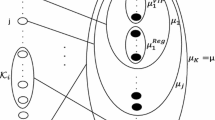Abstract
Carrier aggregation (CA) is one of the main enabling technologies for the 5G wireless networks. The CA increases overall bandwidth of the wireless networks for both uplink and downlink. In 5G wireless networks, both 5th and earlier generation users need to assign resources over the aggregated bandwidth. Earlier scheduling mechanisms cannot be applied directly to 5G wireless networks with the CA. A mechanism is needed to support resource scheduling over the aggregated bandwidth. Recent work on the resource scheduling has considered component carrier selection, resource allocation and link adaption as separate issues. In this paper, we model the problem as a matching game. Game theory is utilized for the resource matching in the proposed algorithm with a matching game model designed to match resources. Stable matching problems match two sets of candidates such that the outcome is stable. With a stable outcome, there is no incentive for candidates on either side to form a new pair. This paper introduces the concept of using the matching game for resource allocation in the carrier aggregated 5G wireless networks. The proposed algorithm considers channel conditions while matching resources. A cross-carrier resource allocation method is used, and stable matching is completed with the matching game.











Similar content being viewed by others
References
Abdulkadiroglu, A., & Sönmez, T. (2013). Matching markets: Theory and practice. Advances in Economics and Econometrics, 1, 3–47.
Alam, M. J., & Ma, M. (2015). Pareto efficient resource matching for lte-a system. In: 2015 10th International Conference on Information, Communications and Signal Processing (ICICS), pp. 1–5. doi:10.1109/ICICS.2015.7459825.
Alam, M. J., & Ma, M. (2015). Radio resource management by evolutionary algorithms for 4g lte-advanced networks. In X. S. Yang, S. F. Chien, & T. O. Ting (Eds.), Bio-inspired computation in telecommunications (pp. 141–162). Burlington: Morgan Kaufmann.
An, C., Zhang, L., & Liu, W. (2009). A spectrum allocation algorithm based on matching game. In: Wireless Communications, Networking and Mobile Computing, 2009. WiCom’09. 5th International Conference on, pp. 1–3. IEEE.
Chen, L., Chen, W., Zhang, X., & Yang, D. (2009). Analysis and simulation for spectrum aggregation in lte-advanced system. In: Vehicular Technology Conference Fall (VTC 2009-Fall), 2009 IEEE 70th, pp. 1–6. IEEE.
Chen, Y.W., Peng, I., & Lai, C.Y., et al. (2012). Study of radio resource allocation scheme for single carrier fdma in lte network. In: Vehicular Technology Conference (VTC Spring), 2012 IEEE 75th, pp. 1–5. IEEE.
Chung, Y.L., Jang, L.J., & Tsai, Z. (2011). An efficient downlink packet scheduling algorithm in lte-advanced systems with carrier aggregation. In: Consumer communications and networking conference (CCNC), 2011 IEEE, pp. 632–636. IEEE.
Chung, Y.L., & Tsai, Z. (2010). A quantized water-filling packet scheduling scheme for downlink transmissions in lte-advanced systems with carrier aggregation. In: Software, Telecommunications and Computer Networks (SoftCOM), 2010 International Conference on, pp. 275–279.
Gale, D., & Shapley, L. S. (1962). College admissions and the stability of marriage. American mathematical monthly (pp. 9–15).
Jain, R., Chiu, D., & Hawe, W. (1998). A quantitative measure of fairness and discrimination for resource allocation in shared computer systems. arXiv preprint cs/9809099.
Lee, S.B., Choudhury, S., Khoshnevis, A., Xu, S., & Lu, S. (2009). Downlink mimo with frequency-domain packet scheduling for 3gpp lte. In: INFOCOM 2009, IEEE, pp. 1269–1277. doi:10.1109/INFCOM.2009.5062041.
Lei, L., & Zheng, K. (2009). Performance evaluation of carrier aggregation for elastic traffic in LTE-advanced systems. IEICE Transactions on Communications, 92(11), 3516–3519.
Nakamura, T. (2011). Feasibility study for further advancement for E-UTRA (LTE-advanced). 3rd Gen. Partner. Proj., Sophia Antipolis, France, TS36, 912, V9.
Roth, A. E. (2008). Deferred acceptance algorithms: History, theory, practice, and open questions. International Journal of Game Theory, 36(3–4), 537–569.
Roth, A. E., & Sotomayor, M. A. O. (1992). Two-sided matching: A study in game-theoretic modeling and analysis. 18. Cambridge: Cambridge University Press.
Songsong, S., Chunyan, F., & Caili, G. (2009). A resource scheduling algorithm based on user grouping for LTE-advanced system with carrier aggregation. In: Computer Network and Multimedia Technology, 2009. CNMT 2009. International Symposium on, pp. 1–4. doi:10.1109/CNMT.2009.5374801.
Tian, H., Gao, S., Zhu, J., & Chen, L. (2011). Improved component carrier selection method for non-continuous carrier aggregation in LTE-advanced systems. In: Vehicular Technology Conference (VTC Fall), 2011 IEEE, pp. 1–5. IEEE.
Tian, H., Gao, S., Zhu, J., & Chen, L. (2011). Improved component carrier selection method for non-continuous carrier aggregation in LTE-advanced systems. In: Vehicular Technology Conference (VTC Fall), 2011 IEEE, pp. 1–5. doi:10.1109/VETECF.2011.6092963.
Wang, Y., Pedersen, K., Mogensen, P., & Sorensen, T. (2009). Carrier load balancing methods with bursty traffic for LTE-advanced systems. In: Personal, Indoor and Mobile Radio Communications, 2009 IEEE 20th International Symposium on, pp. 22–26. doi:10.1109/PIMRC.2009.5450152.
Wang, Y., Pedersen, K., Mogensen, P. E., & Sørensen, T. B., et al. (2009). Resource allocation considerations for multi-carrier LTE-advanced systems operating in backward compatible mode. In: Personal, Indoor and Mobile Radio Communications, 2009 IEEE 20th International Symposium on, pp. 370–374. IEEE.
Wang, Y., Pedersen, K., Sorensen, T., & Mogensen, P. (2011). Utility maximization in LTE-advanced systems with carrier aggregation. In: Vehicular Technology Conference (VTC Spring), 2011 IEEE 73rd, pp. 1–5. doi:10.1109/VETECS.2011.5956494.
Wang, Y., Pedersen, K., Sørensen, T. B., Mogensen, P. E., et al. (2010). Carrier load balancing and packet scheduling for multi-carrier systems. Wireless Communications, IEEE Transactions on, 9(5), 1780–1789.
Zhang, L., Liu, F., Huang, L., & Wang, W. (2010). Traffic load balance methods in the LTE-advanced system with carrier aggregation. In: Communications, Circuits and Systems (ICCCAS), 2010 International Conference on, pp. 63–67. IEEE.
Zhang, L., Wang, Y., Huang, L., Wang, H., & Wang, W. (2009). Qos performance analysis on carrier aggregation based lte-a systems. In: Wireless Mobile and Computing (CCWMC 2009), IET International Communication Conference on, pp. 253–256.
Zhang, L., Zheng, K., Wang, W., & Huang, L. (2011). Performance analysis on carrier scheduling schemes in the long-term evolution-advanced system with carrier aggregation. IET Communications, 5(5), 612–619.
Author information
Authors and Affiliations
Corresponding author
Rights and permissions
About this article
Cite this article
Alam, M.J., Ma, M. Resource Matching in Carrier Aggregation Enabling 5G Networks. Wireless Pers Commun 95, 1229–1248 (2017). https://doi.org/10.1007/s11277-016-3826-3
Published:
Issue Date:
DOI: https://doi.org/10.1007/s11277-016-3826-3




